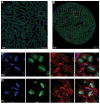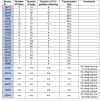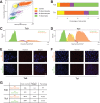Successful transmission and transcriptional deployment of a human chromosome via mouse male meiosis
- PMID: 27855777
- PMCID: PMC5161449
- DOI: 10.7554/eLife.20235
Successful transmission and transcriptional deployment of a human chromosome via mouse male meiosis
Abstract
Most human aneuploidies originate maternally, due in part to the presence of highly stringent checkpoints during male meiosis. Indeed, male sterility is common among aneuploid mice used to study chromosomal abnormalities, and male germline transmission of exogenous DNA has been rarely reported. Here we show that, despite aberrant testis architecture, males of the aneuploid Tc1 mouse strain produce viable sperm and transmit human chromosome 21 to create aneuploid offspring. In these offspring, we mapped transcription, transcriptional initiation, enhancer activity, non-methylated DNA, and transcription factor binding in adult tissues. Remarkably, when compared with mice derived from female passage of human chromosome 21, the chromatin condensation during spermatogenesis and the extensive epigenetic reprogramming specific to male germline transmission resulted in almost indistinguishable patterns of transcriptional deployment. Our results reveal an unexpected tolerance of aneuploidy during mammalian spermatogenesis, and the surprisingly robust ability of mouse developmental machinery to accurately deploy an exogenous chromosome, regardless of germline transmission.
Keywords: aneuploidy; chromosomes; epigenetic reprogramming; genes; human; male germline; meiosis; mouse.
Conflict of interest statement
DTO: Reviewing editor, eLife. The other authors declare that no competing interests exist.
Figures

















References
-
- Afgan E, Baker D, van den Beek M, Blankenberg D, Bouvier D, Čech M, Chilton J, Clements D, Coraor N, Eberhard C, Grüning B, Guerler A, Hillman-Jackson J, Von Kuster G, Rasche E, Soranzo N, Turaga N, Taylor J, Nekrutenko A, Goecks J. The Galaxy platform for accessible, reproducible and collaborative biomedical analyses: 2016 update. Nucleic Acids Research. 2016;44:gkw343. doi: 10.1093/nar/gkw343. - DOI - PMC - PubMed
-
- Bernstein BE, Mikkelsen TS, Xie X, Kamal M, Huebert DJ, Cuff J, Fry B, Meissner A, Wernig M, Plath K, Jaenisch R, Wagschal A, Feil R, Schreiber SL, Lander ES. A bivalent chromatin structure marks key developmental genes in embryonic stem cells. Cell. 2006;125:315–326. doi: 10.1016/j.cell.2006.02.041. - DOI - PubMed
Publication types
MeSH terms
Grants and funding
LinkOut - more resources
Full Text Sources
Other Literature Sources
Molecular Biology Databases

